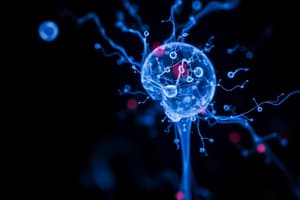Podcast
Questions and Answers
________ involves the detection of physical stimuli from our environment and is made possible by the activation of specific receptor cells.
________ involves the detection of physical stimuli from our environment and is made possible by the activation of specific receptor cells.
- Perception
- Sensation (correct)
- Adaptation
- Sublimation
The lowest level of stimulation that a person can consciously detect 50 percent of the time the stimulation is present is called
The lowest level of stimulation that a person can consciously detect 50 percent of the time the stimulation is present is called
- Sensory adaptation
- Just noticeable difference
- Sensation
- Absolute threshold (correct)
After being in class for a while, ____________ is a likely explanation for not hearing the sound of the lights buzzing above you until someone says something about it.
After being in class for a while, ____________ is a likely explanation for not hearing the sound of the lights buzzing above you until someone says something about it.
- Sublimation
- Adaptation
- Habituation (correct)
- Accommodation
You are drinking a strong cup of coffee that is particularly bitter. After a while, the coffee doesn't taste as strong as it did when you first tasted it. What has happened?
You are drinking a strong cup of coffee that is particularly bitter. After a while, the coffee doesn't taste as strong as it did when you first tasted it. What has happened?
Which of the following is largely determined by the length of a light wave?
Which of the following is largely determined by the length of a light wave?
Aside from the lens, damage to the ________ can affect the eye's ability to focus light.
Aside from the lens, damage to the ________ can affect the eye's ability to focus light.
In farsightedness, also known as _______________, the focal point is _____________ the retina.
In farsightedness, also known as _______________, the focal point is _____________ the retina.
Colleen stares at a fixed spot in her bedroom using only one eye. After a while, what might happen to her vision?
Colleen stares at a fixed spot in her bedroom using only one eye. After a while, what might happen to her vision?
What are the three primary colors as proposed by the trichromatic theory?
What are the three primary colors as proposed by the trichromatic theory?
Which of the following best explains afterimages?
Which of the following best explains afterimages?
The part of the ear that can be seen is also called the
The part of the ear that can be seen is also called the
The oval window is found in what part of the ear?
The oval window is found in what part of the ear?
Which theory cannot adequately account for pitches above 1,000 Hz?
Which theory cannot adequately account for pitches above 1,000 Hz?
Ethan has suffered minor damage to the bones in his left middle ear. What treatment, if any, might help restore his hearing?
Ethan has suffered minor damage to the bones in his left middle ear. What treatment, if any, might help restore his hearing?
Which is considered the most common type of permanent hearing loss?
Which is considered the most common type of permanent hearing loss?
Taste is often called a ____________ sense because it works with the molecules of foods that people eat.
Taste is often called a ____________ sense because it works with the molecules of foods that people eat.
Research has found that taste information is sent to the
Research has found that taste information is sent to the
How often are olfactory receptors replaced by new olfactory receptors?
How often are olfactory receptors replaced by new olfactory receptors?
Olfactory receptors project directly to the ________________ and are unique in that signals do not first connect to the thalamus.
Olfactory receptors project directly to the ________________ and are unique in that signals do not first connect to the thalamus.
__________ are tactile receptors that are located just beneath the skin and respond to changes in pressure.
__________ are tactile receptors that are located just beneath the skin and respond to changes in pressure.
In gate-control theory, substance P
In gate-control theory, substance P
Flashcards
Sensation
Sensation
Detection of physical stimuli through receptor cells.
Absolute Threshold
Absolute Threshold
Minimum stimulation detectable 50% of the time.
Habituation
Habituation
Decreased response to unchanging stimuli over time.
Sensory Adaptation
Sensory Adaptation
Signup and view all the flashcards
Light Wave Properties
Light Wave Properties
Signup and view all the flashcards
Farsightedness (Hyperopia)
Farsightedness (Hyperopia)
Signup and view all the flashcards
Myopia (Nearsightedness)
Myopia (Nearsightedness)
Signup and view all the flashcards
Trichromatic Theory
Trichromatic Theory
Signup and view all the flashcards
Afterimages
Afterimages
Signup and view all the flashcards
Pinna
Pinna
Signup and view all the flashcards
Oval Window
Oval Window
Signup and view all the flashcards
Place Theory
Place Theory
Signup and view all the flashcards
Sensorineural Hearing Loss
Sensorineural Hearing Loss
Signup and view all the flashcards
Taste as a Chemical Sense
Taste as a Chemical Sense
Signup and view all the flashcards
Olfactory Receptors
Olfactory Receptors
Signup and view all the flashcards
Taste Processing
Taste Processing
Signup and view all the flashcards
Pacinian Corpuscles
Pacinian Corpuscles
Signup and view all the flashcards
Gate-Control Theory
Gate-Control Theory
Signup and view all the flashcards
Proprioception
Proprioception
Signup and view all the flashcards
Visual Distortion
Visual Distortion
Signup and view all the flashcards
Study Notes
Sensation and Perception
- Sensation: Involves detection of physical stimuli through activation of specific receptor cells.
- Absolute Threshold: Minimum level of stimulation that can be detected 50% of the time.
- Habituation: Decreased response to unchanging stimuli over time, such as not hearing buzzing lights.
- Sensory Adaptation: Reduced sensitivity to constant stimuli, leading to changes in perception (e.g., coffee taste becoming less intense).
Vision
- Light Wave Properties: Length of a light wave primarily determines color.
- Eye Anatomy: Damage to the cornea can affect focusing ability; key parts include the lens, pupil, retina, and iris.
- Farsightedness (Hyperopia): Occurs when focal point is beyond the retina, while myopia (nearsightedness) has its focal point in front of the retina.
- Visual Distortion: Fixating on a single spot can cause objects to appear more distorted.
Color Theory
- Trichromatic Theory: Proposes three primary colors—red, green, blue.
- Afterimages: Best explained by opponent-process theory, which involves color perception and lasting effects on vision post-exposure.
Hearing
- Visible Ear: The part of the ear that can be seen is called the pinna.
- Oval Window: Located in the middle ear; important for transferring sound vibrations to the inner ear.
- Pitch Theories: Place theory does not adequately explain pitches above 1,000 Hz; frequency theory is also used to explain sound perception.
- Hearing Loss Types: Sensorineural hearing loss is the most common, while conductive hearing loss is also common but less so.
Taste and Smell
- Taste as a Chemical Sense: Works with food molecules; intrinsic to the flavor experience.
- Olfactory Receptors: Project directly to olfactory bulbs, bypassing the thalamus, and are replaced every 5-8 weeks.
- Taste Processing: Taste information is sent to the insula and frontal operculum of the brain for processing.
Touch and Pain
- Tactile Receptors: Pacinian corpuscles detect pressure changes underneath the skin.
- Gate-Control Theory: Involves substance P, which opens spinal gates for pain, contrasting with the function of endorphins that block pain transmission.
Kinesthetic Sense
- Proprioception: Awareness of body position, allowing knowledge of limb placement without visual input.
Studying That Suits You
Use AI to generate personalized quizzes and flashcards to suit your learning preferences.




